- europages
- >
- COMPANIES - SUPPLIERS - SERVICE PROVIDERS
- >
- alloys
Results for
Alloys - Import export
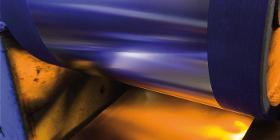
AMETEK SPECIALTY METAL PRODUCTS
United States
SS 436 is a corrosion and heat resistant ferritic Chromium Steel. It can be polished to appear similar to Chromium plate. The material is magnetic in both annealed and cold rolled tempers. This grade of ferritic stainless steel has shown a greater resistance to ridging or roping defects as compared to type 430 stainless steel. The alloy can be readily blanked and formed. The material can be resistance welded, brazed, and soldered. SS 436 is resistant to atmospheric corrosion and fresh water, but it not resistant to most salts and seawater. It is resistant to scaling by oxidation up to about 1400°F. Available Sizes: SS 436 is available from Hamilton Precision Metals as strip product in thicknesses from 0.001” to 0.050” (0.0254 mm to 1.27 mm) in widths up to 15.0” (381 mm). The material conforms to ASTM A240 and UNS S43600.
Request for a quote
AMETEK SPECIALTY METAL PRODUCTS
United States
Our Spinodal materials are custom-engineered for safety hand tools that are non-sparking, non-magnetic and highly corrosion resistant. They benefit from age hardening techniques that further increase their strength and hardness for high performance safety tools. Alloys AM 388™ (UNS C72650) is a copper based Spinodal alloy that offers non-sparking, non-magnetic and high strength properties. AM 388™ is accepted as a safe replacement material for Beryllium Copper alloy. Safety Tool Applications Engineered for an array of hand-held non-sparking safety tools including: Corrosion resistant wrenches Hammers, axes and picks Corrosion resistant screwdrivers, pliers and spatulas
Request for a quote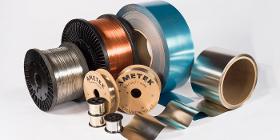
AMETEK SPECIALTY METAL PRODUCTS
United States
L-605™ is a nonmagnetic cobalt-based chromium-tungstennickel alloy that has excellent corrosion and oxidation resistance, and high strength at both room and elevated temperatures. Through work hardening, high strength levels can be obtained. L-605™ has a minimal heat treatment response, but can be used in the cold worked and aged condition. Applications include medical implant devices, springs, valves, and engine components for the aerospace industry. As a result of its high tungsten content, L-605TM is radiopaque, which is beneficial for implant medical devices, such as stents. Because of the alloy’s high work hardening rate, only minimal reductions can be taken before solution annealing will be required. L-605TM is very resistant to oxidation and scaling at elevated temperatures, and is nonmagnetic in all conditions. L-605™ is produced by vacuum induction melting followed by electroslag remelting (VIM-ESR), and as such, has a low nonmetallic inclusion level.
Request for a quote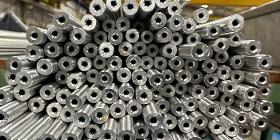
AMETEK SPECIALTY METAL PRODUCTS
United States
Alloy 718 was initially developed for the aerospace industry but its excellent strength and corrosion resistance were recognised by the oil industry and it is now widely used in this field also. Alloy 718 is a nickel-chromium alloy with additions of niobium & molybdenum which can be heat-treated to give high strength, good corrosion resistance, ease of formability and which can be welded with good resistance to strain age cracking. The alloy can be used at temperatures up to 700ºC. Alloy 718 for the oil industry is heat treated such that the hardness does not exceed 40HRC which is the maximum allowed by NACE MR-01-75/ ISO 15156: 3 to prevent stress corrosion cracking. Alloy 718 for aerospace and power generation is heat treated to give maximum strength and high creep resistance with typical hardness values exceeding 42HRC. The major applications are components for gas turbines, aircraft engines Please note that we have a minimum order value of £10,000.
Request for a quote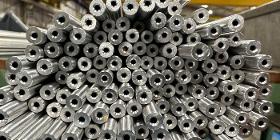
AMETEK SPECIALTY METAL PRODUCTS
United States
Nickel based alloys are very useful materials for the manufacture of high quality tubing products. One of the key reasons is that they offer excellent corrosion resistance in both aqueous and high temperature applications. Nickel alloy tubes offer excellent corrosion resistance, high melting points and resistance to oxidationIn addition to their high melting points and resistance to oxidation and corrosion, nickel alloys are very ductile. Nickel based alloys have a higher ability to accept alloying elements in solid solution than other stainless steel or iron-based alloys. They cantherefore maintain higher metallurgical stability. The combination of high alloying with multiple elements can provide very good corrosion resistance in a wide range of environments while still maintaining good welding and forming characteristics. Please note that we have a minimum order value of £10,000.
Request for a quote
AMETEK SPECIALTY METAL PRODUCTS
United States
Here at Hamilton Precision Metals, we’re passionate about cold rolling metal strip in a diverse range of specialty alloys to meet your exacting specifications. Our extensive precision strip product range include stainless steel strip, nickel strip, titanium strip, copper based strip, cobalt based strip and many more alloys. We have the expertise to roll light gauge strip from 1.5 mm (.060”) down to 0.127 mm (0.005”). Broadest Range of Alloys We offer an extensive portfolio of almost every high performance alloy made today. Additional alloys are available upon request, contact us today! Stainless Steels Nickel Based Alloys Copper Based Alloys Cobalt Based Alloys Commercially Pure Titaniums Strain Gage: Constantan®, Evanohm®,
Request for a quote
AMETEK SPECIALTY METAL PRODUCTS
United States
Hamilton Precision Metals is the world leader of precision-rolled foil and ultra-light gauge strip in any alloy. This includes stainless steel foil, titanium foil, nickel foil, copper based foil, cobalt based foil, Constantan® foil, Evanohm® foil, and many other alloys. Metal foil is generally defined as strip 0.004” (0.1016 mm) and below. Cold rolling strip to these extremely thin gauges demands extensive rolling expertise to manufacture with precision and consistency. Foil in Any Alloy We offer the broadest portfolio of almost every high performance alloy made today. Additional alloys are available upon request, contact us today! Stainless Steels Nickel Based Alloys Copper Based Alloys Cobalt Based Alloys Commercially Pure Titaniums Strain Gage: Constantan®, Evanohm®, Tightest Tolerances and Thinnest Gauges in the Industry We custom roll metal foil in nearly any alloy and specialty metal to the tightest tolerances and thinnest gauges
Request for a quote
AMETEK SPECIALTY METAL PRODUCTS
United States
Havar® is a heat treatable Cobalt base alloy that provides very high strength. The alloy has excellent corrosion resistance and is non-magnetic. Applications have included metal diaphragms for aerospace sensors, metal diaphragms for burst discs, power springs, gap spacers in magnetic heads, and target foils in nuclear physics. Forming cold rolled Havar requires large radius (90° Bend – 8 X thickness) prior to age hardening. The joining can be accomplished using both welding and soldering techniques.The ultimate endurance life is achieved by heat treating the alloy at 1000°F after 80% cold work. The alloy will retain 75% of room temperature strength up to 950°F (Figure 1). Available Sizes: Havar® is available from Hamilton Precision Metals as strip product in thicknesses from 0.0005” to 0.025” (0.0127 mm to 0.635 mm) and widths to 7.5” (190.5 mm). A foil product is available in thicknesses down to 0.000060” and widths of 4.0” (101.6 mm). The material corresponds to UNS R30004.
Request for a quote
AMETEK SPECIALTY METAL PRODUCTS
United States
HPM 233® Nickel is a commercially pure wrought Nickel with low carbon. The material has excellent corrosion resistance with high thermal and electrical conductivities. A high thermal coefficient of electrical resistance makes it suitable for temperature sensors, and electronic components. The alloy can be formed by all conventional cold-forming methods and can be joined by welding, brazing and soldering. The corrosion resistance is generally very good in most mediums, although it is subject to intergranular embrittlement by sulfur compounds above 315°C. Available Sizes: HPM 233® Nickel is available from Hamilton Precision Metals as strip product in thicknesses from 0.0005” to 0.020” (0.0127 mm to 0.508 mm) in widths up to 12.0” (304.8 mm). It is available as foil as thin as 0.000100” (0.00254 mm) in 4.0” (101.6 mm) maximum width. The material conforms to ASTM B162, ASTM F3, and UNS N02233.
Request for a quote
AMETEK SPECIALTY METAL PRODUCTS
United States
Nickel alloys display high strength and excellent corrosion resistance, making it a great metal for use in highly corrosive environments and high temperature environments. Hamilton Precision Metals offers an array of high-performance nickel alloys that are engineered to withstand a variety of severe operating conditions.
Request for a quote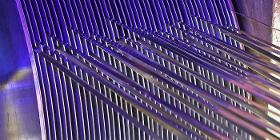
AMETEK SPECIALTY METAL PRODUCTS
United States
AMETEK Specialty Metal Products has applied the high purity wrought powder compaction process to Ductile Cobalt Alloys in order to produce multiple ductile cobalt strip products generally used by weld wire manufacturers as sheathing for flux cored and metal cored hardfacing materials. These alloys range from 80 to 95% cobalt with Iron or Iron-Nickel additions to improve ductility for drawing operations.
Request for a quote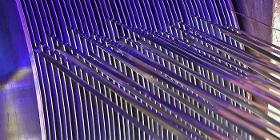
AMETEK SPECIALTY METAL PRODUCTS
United States
Titanium for Implantable Medical Devices Ti 6Al/4V ELI sheet has found application in medical implants owing to its excellent biocompatibility, high strength, and MRI compatibility. In the cold rolled and annealed temper the material will not exhibit a continuous alpha network at prior beta grain boundaries or a continuous alpha case layer on the surface. Owing to the alloy’s high strength and low ductility, it is difficult to cold draw into finished shapes. Hot forming has been found to be effective.
Request for a quote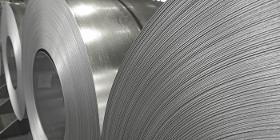
AMETEK SPECIALTY METAL PRODUCTS
United States
Nickel 201/200 strip (899L) is our premier battery grade that offers improved conductivity over Nickel 200 and Nickel 201 strip while maintaining closer mechanical properties to the lower conductivity materials.
Request for a quote
AMETEK SPECIALTY METAL PRODUCTS
United States
AMETEK has the metallurgical expertise to produce specialty powders for super-niche and highly engineered applications. Our experience has made us a global leader in the field. Customized and Specialty Alloys Utilizing high pressure water atomization under carefully controlled conditions, we develop innovative powders in an extensive range of standard and custom alloys. Niche Applications Our high alloy powders are used in specialty segments including Sintered Metal Filters, Fiber – polyester and nylon production, Plastic Compounding, Hardfacing and Surface Coating, Powder Metallurgy (P/M), and Metal Injection Molding (MIM). Typical alloys include
Request for a quote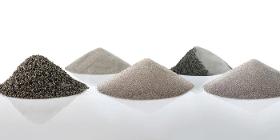
AMETEK SPECIALTY METAL PRODUCTS
United States
Our metallurgists specialize in the design, development and production of specialty metal powders manufactured through advanced high-pressure water atomization technology. We work alongside our customers to develop custom metal alloy powder solutions to exacting specifications for critical applications. Our expertise and nearly 50 years of history in water atomization of specialty metal powder products has led us to supply a huge number of market sectors ranging from automotive to semiconductor to aerospace across the test globe. Water Atomization Process We employ an advanced high-pressure water atomization process to engineer highly customized metal powder. Our technology is proven to achieve fine particle size distributions, enabling our metallurgists to produce precision metal powder products.
Request for a quote
AMETEK SPECIALTY METAL PRODUCTS
United States
We manufacture bar and tube products in our corrosion resistant Spinodal alloy, Pfinodal® (C72900), for use in downhole housings, centralizers, and joints that operate in demanding subsea environments. Advantages Our Copper nickel tin Pfinodal® (C72900) bar and tube products present a combination of unique properties that deliver significant advantages for downhole oil and gas applications. Non-sparking and non-magnetic Anti-galling Anti-corrosive Heat treatable to high hardness Safe alternative to Beryllium Copper (BeCu) Pfinodal ® (C72900) Bar and Tube C72900 copper alloy materials are available in bar and tube sizes up to 6” (152.4mm) diameters as well as in both strip and plate products. Our C72900 material is generally provided as machining bar in the aged condition with many sizes available to ship from inventory. We also offer the ability to provide turnkey solutions by providing fully machined parts to OEM drawings.
Request for a quote
AMETEK SPECIALTY METAL PRODUCTS
United States
At AMETEK Specialty Metal Products we produce high purity nickel-iron alloy strips, which are primarily used for reed switch systems. These products are widely used in the automotive market for BMS (Battery Management Systems), improved safety in proximity sensors, and cable harness testing. Alloys Our strips are produced using nickel-iron compositions, making sure to use source metals with market leading low levels of trace elements. Alloys include: Nickel-Iron compositions from 36% to 65% Nickel. Sizes Strip thicknesses down to 0.002” (0.0508mm) and wire diameters as small as 0.005” (0.127mm). Applications Finished nickel-iron alloy reed switch systems are used within a multitude of products and devices, mainly being used in the Automotive and Electronics industries. Automotive: BMS (Battery Management Systems), automatic braking assists, door sensors and speedometers.
Request for a quoteDo you sell or make similar products?
Sign up to europages and have your products listed

AMETEK SPECIALTY METAL PRODUCTS
United States
Our highly specialized Spinodal materials are custom-engineered for electronic connectors and deliver major advantages in comparison to traditional materials such as Beryllium Copper (BeCu). We offer precision strip and wire products in alloy Pfinodal® (UNS C72900), a copper nickel tin Spinodal alloy, for the manufacturing of high performance electronic connectors in the electronics industry. Safe Alternative to Beryllium Copper (BeCu) Beryllium Copper (BeCu) materials are the historical choice for electronic connectors. Our high performance Pfinodal® (UNS C72900) delivers similar mechanical properties to Beryllium Copper but without the harmful exposure risks.
Request for a quote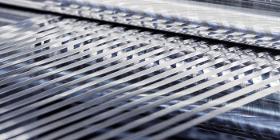
AMETEK SPECIALTY METAL PRODUCTS
United States
Our Nickel-Iron-Cobalt alloys are engineered to ASTM F15 standards for sealing materials and their specified coefficients of thermal expansion. These materials used primarily for making hermetic seals with harder glasses and ceramics (lids for hybrid packages). Nickel-Iron-Cobalt alloys include F-15 alloy, Kovar ® and Rodar ®. The low levels of impurities in the material reduce the chance of out-gassing over time; a critical role in maintaining the hermetic seal.
Request for a quote
AMETEK SPECIALTY METAL PRODUCTS
United States
Our Nickel-Iron alloys are engineered to the ASTM F30 standards for sealing materials and their specified coefficients of thermal expansion. These materials are generally used as the sealing material to bridge the difference between two materials of differing expansion rates during heating and to maintain a hermetic seal. These Nickel-Iron Strip Products are generally used in glass to metal sealing applications ranging from light bulbs to hermetically sealed integrated circuits as well as electrical applications such as switch-gear connections and reed switch systems. Nickel Iron alloys include Invar®, alloys 42, 46, 48 and 52. Others available on request.
Request for a quote
AMETEK SPECIALTY METAL PRODUCTS
United States
We offer two Spinodal alloy grades produced through the same wrought powder metallurgy as copper based products with nickel and tin additions. Our Pfinodal® (C72900) and AM 388® (C72650) spinodal materials deliver similar mechanical properties to Beryllium Copper alloy (C17200) but without the carcinogenic exposure risks. Advantages include: No carcinogenic elements - only copper/nickel/tin Ductile state and heat treatable Electrically conductive Reduced distortion during heat treatment Reduced stress relaxation Safe Alternative to Beryllium Copper (UNS C17200) Recently, Pfinodal® and AM-388® have been chosen as a replacement for Beryllium Copper due to the carcinogenic effects of Beryllium and fears of bans on Beryllium containing products due to REACH, RoHS, and OSHA mandates. Spinodal materials are gaining acceptance in new projects as well as legacy qualifications as manufacturers, OEMs, and consumers reject products
Request for a quote
AMETEK SPECIALTY METAL PRODUCTS
United States
Phosphor Bronze A is a Copper base spring material with a good combination of strength, formability, and corrosion resistance. The material is suitable for use in certain contact springs and diaphragms. The alloy has good formability up to moderate strength. It can be soldered, silver brazed, and resistance welded. Available Sizes: Phosphor Bronze A is available from Hamilton Precision Metals as strip products in thicknesses from 0.001” to 0.020” (0.0254 mm to 0.508 mm) in widths up to 12.0” (304.8 mm). The material conforms to ASTM B 103 and UNS C51000.
Request for a quote
AMETEK SPECIALTY METAL PRODUCTS
United States
Beryllium Copper 25 is a Copper base alloy with the capability of being strengthened by precipitation heat treatment. The alloy furnishes the best combination of electrical conductivity, corrosion resistance and mechanical strength necessary for numerous electronic and electromechanical devices. The alloy is quite satisfactory for fabrication with good formability and joining characteristics. Forming is readily accomplished from the annealed temper. Severe bending will be less successful from hard or heat treated tempers and requires large fold radius ratios. Beryllium Copper 25 is able to be soldered, brazed, and welded by most standard techniques. The brazing temperature must be kept under 1450º F and cycle time minimized to avoid loss of heat treated strength. Heat treating should be performed subsequent to welding to obtain uniform high strength. The alloy is not susceptible to an increase in magnetic attraction from plastic deformation during service
Request for a quote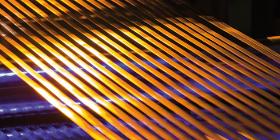
AMETEK SPECIALTY METAL PRODUCTS
United States
Shunt Manganin is a Copper-Manganese resistance alloy used for shunts in various high current applications. The alloy has a low temperature coefficient of resistivity with peak resistance at about 50°C. The thermal EMF vs. Copper is very low. The alloy can be easily formed from the annealed temper.The maximum recommended operating temperature in air is 200°F. Available Sizes: Shunt Manganin is available from Hamilton Precision Metals as strip product in thicknesses from 0.0005 to 0.053” (0.0127 mm to 1.346 mm) in widths up to 12.0” (304.8 mm). It is also available in foil as thin as 0.000100” (0.00254 mm) in widths of 4.0” (101.6 mm) maximum.
Request for a quote
AMETEK SPECIALTY METAL PRODUCTS
United States
Cu-Ni 715 is a copper-nickel alloy that is resistant to corrosion in sea water. The alloy has good fatigue strength and relatively high thermal conductivity. This alloy is used mainly for flexible metal foil heaters. The alloy is readily formed in the annealed temper, and can be joined by the standard welding, brazing and soldering processes. Available Sizes: Cu-Ni 715 is available from Hamilton Precision Metals as strip product in thicknesses from 0.0005” to 0.010” (0.0127 mm to 0.254 mm) in widths up to 12” (304.8 mm). The material conforms to ASTM B122 and UNS C71500.
Request for a quote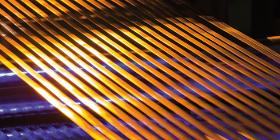
AMETEK SPECIALTY METAL PRODUCTS
United States
Copper alloys exhibit very high electrical and thermal conductivities, offering twice the conductivity of aluminum and thirty times the conductivity of stainless steel. Other advantageous characteristics include outstanding strength (notably copper beryllium alloys) and corrosion resistance as well as antimicrobial properties. Copper is most commonly used in electrical and electronic applications.
Request for a quote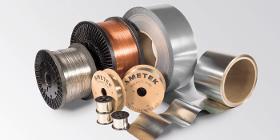
AMETEK SPECIALTY METAL PRODUCTS
United States
HPM® 80/20 AL is a resistance alloy with a unique composition that provides deep draw capability. It is used as a heating element in electronic applications. HPM® 80/20 AL has good forming characteristic and canbe deep drawn. It is not suitable for extended exposure to air at the elevated temperatures. Available Sizes: HPM® 80/20 AL is available from Hamilton Precision Metals as strip product in thicknesses from 0.0005” to 0.050” (0.0127 mm to 1.27 mm) and width up to 12.0” (304.8 mm). Foil Product may be supplied to a thickness of 0.0001” (0.00254 mm) in width up to 4.0” (101.6 mm).
Request for a quote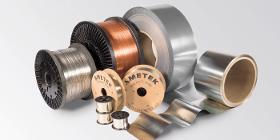
AMETEK SPECIALTY METAL PRODUCTS
United States
HPM® 80/20 A is a resistance alloy used in electric heating applications. It is recommended for use in dry air applications up to 2150°F with good hot strength. Such as, flexible metal foil heaters and airbag igniters. The alloy forms rather well and has good welding characteristic. Caution should be used to avoid extended exposure to elevated temperature in marginally oxidizing or partially reducing atmospheres as it would be susceptible to “green rot” corrosion, carburization and sulfurization. Available Sizes: HPM® 80/20 A is available from Hamilton Precision Metals as strip product in thicknesses from 0.0005” to 0.050” (0.0127 mm to 1.27 mm) and width up to 12” (304.8 mm). The material conforms to ASTM B-344. Foil product may be supplied in thickness to 0.0001” (0.00254 mm) in width up to 4.0” (101.6 mm).
Request for a quote
AMETEK SPECIALTY METAL PRODUCTS
United States
HPM® 600 is well suited for severe corrosive environments and is oxidation resistant through 2150°F. Such as, metal diaphragms for aerospace sensors, flexible metal foil heaters and metal diaphragms for burst discs. The strength can be increased by cold working. The material has good elevated strength retention through 800°F. The alloy is readily formed in the annealed temper, and can be joined by the standard welding, brazing and soldering processes. Available Sizes: HPM® 600 is available from Hamilton Precision Metals as strip product in thicknesses from 0.0005” to 0.050” (0.0127 mm to 1.27 mm) and width up to 12” (304.8 mm). It is also available in foil as thin as 0.000100” (0.00254 mm) in widths of 4.0” (101.6 mm) maximum. The material conforms to ASTM B168, AMS 5540, MIL N 23228 and UNS N06600.
Request for a quoteResults for
Alloys - Import exportNumber of results
83 ProductsCountries
Company type